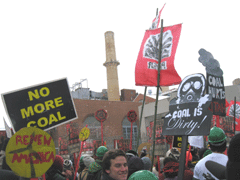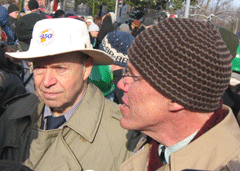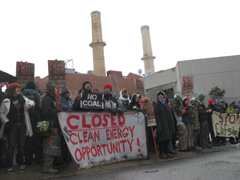Turning up the Heat on Coal
Air Date: Week of March 6, 2009

The first mass civil disobedience in the U.S. aimed at coal and climate change, according to organizers of the Capitol Power protest. (Photo: Jeff Young)
Activists concerned about the climate and the land in coal country are raising the stakes by putting their bodies in the path of coal – blocking mine sites, coal power plants and the companies that finance them. Incidents of civil disobedience aimed at coal power and coal mining are on the rise. Living on Earth's Jeff Young takes a look at who's doing it and whether it will work.
Transcript
GELLERMAN: It’s Living On Earth, I’m Bruce Gellerman.
[CHANTING: “COAL HAS GOT TO GO, COAL HAS GOT TO GO.”]
GELLERMAN: Police in the nation’s capital estimate 2,500 demonstrators recently took to the streets of Washington, DC. The protesters blocked the gates to the coal-burning power plant that heats and cools the US Capitol and many nearby federal office buildings.
Despite the frigid cold weather - and the possibility of arrest - the protesters wanted to bring the fight against global warming to the threshold of Congress.
As Living on Earth’s Jeff Young reports, demonstrators are increasingly using civil disobedience to fight against coal.
YOUNG: NASA scientist James Hansen has been sounding the alarm on global warming for more than 20 years. But even for him, this was new. The renowned climatologist has risked his reputation at congressional hearings and scientific gatherings, by pushing his view of what rising CO2 levels could bring. But now he’s risking something else. Arrest.
HANSEN: Well I can’t let these, I can’t talk about this and then let young people get arrested and I stand back, behind them.

Author Bill McKibben (right) and NASA scientist James Hansen help block the gates to the U.S. Capitol Power Station. (Photo: Jeff Young)
HANSEN: I wouldn’t say I’m an activist. I’m trying to make clear what the connection is between the science and the policy implications. Somebody has to do it!
YOUNG: You know, you have a president in office who’s taking actions to address climate change, why protest now?
HANSEN: Ahh. I think that’s a very good reason, because they’re going to take positions in the near future. So I initially didn’t like the idea, because Obama had not had time. But after thinking about it I decided this is the time to make clear what is needed in order to preserve species and the planet that’s existed for the past 10,000 years.
YOUNG: With that, Hansen joined the march to the smokestacks a few blocks to the
south.
[MARCHING, CHANTING]
YOUNG: It’s not an isolated act. In the last year there were at least eleven incidents of civil disobedience aimed at coal in the US. Coalfield residents blocked mines and power plant construction sites. Activists occupied offices of banks that finance power plants. And the actions show no signs of stopping since the change of power in Washington. If anything, they’re gaining momentum, with a half dozen protests since Obama took office.
MCKIBBEN: What we’ve got to do is give Obama the space he needs to work.
YOUNG: That’s environmental author and activist Bill McKibben, who helped organize the capitol power plant protest along with Greenpeace and Rainforest Action Network.

Did it work? When Congressional leaders caught wind of the coming demonstration, they decided to phase out the use of coal at the capitol power plant.(Photo: Jeff Young)
[CHANTING: “CLEAN IT UP! SHUT IT DOWN!”]
YOUNG: Luke Popovich watched McKibben’s anti-coal army pass by the capitol power plant. Popovich kept a low profile in a trench coat and ball cap. He’s a spokesperson for the National Mining Association, and he was not impressed with what he saw.
POPOVICH: I don’t really think a protest like this menaces an industry that provides 50% of the electricity to Americans. If these people are genuinely interested in preventing climate change and the buildup of greenhouse gases what they ought to be doing is joining with others to support development of clean coal technology.
[CHANTING: “CLEAN COAL? HELL NO! THAT’S A MYTH THAT’S GOT TO GO!”]
YOUNG: So-called “clean coal” would remove CO2 from coal emissions. But even industry experts say the technology is probably a decade away. Critics say it might never work at the scale needed. And if it does come about, clean coal does nothing about the damages from mining, something country singer Kathy Mattea addressed in song.
MATTEA [OVER GUITAR]: Alright, so this is a song about dirty coal on the front end, not the back end. We’re watching what happens when coal burns, well this is what happens when people start blasting off the tops of mountains, and doing all kinds of unthinkable things because of our appetite for energy. [SINGING] “I come from the mountains, Kentucky’s my home…”
YOUNG: In the coal counties of southern West Virginia and eastern Kentucky the long fight over mountaintop removal mining is reaching a new, pitched level with civil disobedience.

Organizers say the Capitol Power protest was the first mass civil disobedience in the U.S. aimed at coal and climate change. (Photo: Jeff Young)
JOHNSON: We use as our primary scripture psalm 24-1. It says “the Earth is the Lord’s and everything in it.”
YOUNG: Johnson knows the direct actions he’s joining could backfire if they alienate the culturally conservative communities he hopes to win over.
JOHNSON: It has to be done carefully, with excellent discipline, nonviolently, with respect to the law enforcement officials, to the neighbors. We want to win the hearts and minds of people. But we do feel that the regulatory system and the state government hath broken down. I’ll say it point blank: they are in the pockets of coal and beholden to the coal interests.
YOUNG: Johnson says more coal country activists plan to be arrested in the coming weeks. But back at the capitol power plant…
[CHANTING: “WE SHUT THEM DOWN”]
YOUNG: …chilly hours passed without any action by police. Roads and gates were blocked, federal property trespassed upon and still, capitol police made no arrests. Eventually James Hansen and the other demonstrators declared victory and walked away.
HANSEN: Yeah I think this was a huge success and a step in the right direction. But it’s not the end. We can’t stop here.
YOUNG: Any disappointment at not getting arrested?
HANSEN: No! I have a lot of work to do. I would much rather get back to that! [Laughter]
YOUNG: The capitol power plant issue had already been settled, anyway, with a letter late last month from congressional leaders Nancy Pelosi and Harry Reid. They instructed the power plant manager to phase out coal in favor of natural gas. A small, symbolic victory that anti-coal activists promise will not be the last.
For Living on Earth, I’m Jeff Young in Washington.
Links
Hear more of Jeff Young’s conversation with author Bill McKibben.
For more of Jeff Young’s conversation with author Wendell Barry, click here.
Listen to Kathy Mattea talk and sing about what coal has done for and to her home state.
Hear more about coal country communities dealing with mountaintop removal.
The wiki-style watchdog SourceWatch keeps tabs on protests and direct action aimed at coal.
Living on Earth wants to hear from you!
Living on Earth
62 Calef Highway, Suite 212
Lee, NH 03861
Telephone: 617-287-4121
E-mail: comments@loe.org
Newsletter [Click here]
Donate to Living on Earth!
Living on Earth is an independent media program and relies entirely on contributions from listeners and institutions supporting public service. Please donate now to preserve an independent environmental voice.
NewsletterLiving on Earth offers a weekly delivery of the show's rundown to your mailbox. Sign up for our newsletter today!
 Sailors For The Sea: Be the change you want to sea.
Sailors For The Sea: Be the change you want to sea.
 The Grantham Foundation for the Protection of the Environment: Committed to protecting and improving the health of the global environment.
The Grantham Foundation for the Protection of the Environment: Committed to protecting and improving the health of the global environment.
 Contribute to Living on Earth and receive, as our gift to you, an archival print of one of Mark Seth Lender's extraordinary wildlife photographs. Follow the link to see Mark's current collection of photographs.
Contribute to Living on Earth and receive, as our gift to you, an archival print of one of Mark Seth Lender's extraordinary wildlife photographs. Follow the link to see Mark's current collection of photographs.
 Buy a signed copy of Mark Seth Lender's book Smeagull the Seagull & support Living on Earth
Buy a signed copy of Mark Seth Lender's book Smeagull the Seagull & support Living on Earth

